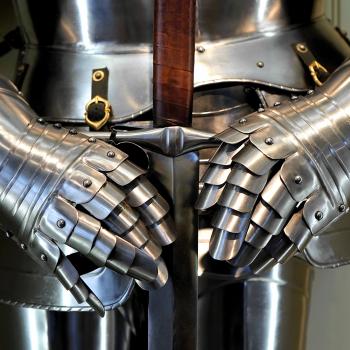To Train Up A Child, chapter 13, part 2
In this post, we continue Michael’s chapter on “attitude training.” Trigger warning for bullying victims, because if it wasn’t painfully obvious from the title, Michael’s about to go there.
PARENTAL PROTOTYPES
Never expect more of your children in the way of attitude than you are yourself. Happy, well balanced parents who neglect the rod and reproof will have grouchy, complaining, tantrum-oriented children. But, in a situation where one or both of the parents are an emotional wreck, not much can be expected from the child. A CHILD IS GOING TO BE THE HARVEST OF THE PARENTS’ TEMPERAMENT. If the mother is sulky, critical or selfish, the children will have a tendency to be the same. If the father is a bully or full of anger and impatience, his sons will be also. If the father is rude, demanding and disrespectful of the mother, the mother will not get much more out of the boys. If a father is intemperate or lustful, the children will likely be worse. God says, I will visit “the iniquities [not guilt, and not blame] of the fathers upon the children unto the third and fourth generation… (Exodus 20: 5).” Children grow up into their father’s and mother’s likeness. I have seen many, despising their parents’ sin, grow up to be just like them.
I don’t like the level of determinism here. My parents do not determine my fate. However, I do agree that parents need to practice what they preach. For example, a parent who tells a child not to hit people should not hit people. Et cetera.
The lesson in this is: YOU MUST BE what you want your child to be—in attitude as well as actions. Don’t try to “beat the ugly” out of a child who is just a display window of your own attitudes.
See now, here’s where it gets confusing. Michael very clearly wants children to be submissive and obedient, but he wants parents to act as dictators, with their word being law. But given these two sentences, shouldn’t parents be submissive and obedient if that’s what they want their children to be?
This is so much easier when your goal is for your children to be compassionate and to practice communication, cooperation, and compromise. If you want your child to be empathetic, you have to practice empathy. Positive parenting makes this whole “model the character traints you want your child to adopt” thing really simple. In reality of course, it’s really challenging—it’s hard to constantly model these things—but it’s at least straightforward rather than confusing.
THEY BETTER NOT MISTREAT MY BABY
An all too common problem, much more often found in mothers, is the “They better not mistreat my baby” syndrome. I can still remember as a youth some cocky, swaggering brat sneering out of one side of his mouth, gloweringly threatening to tell his mother. How did parents produce such ugliness?
It’s easy. Just be very protective of your child and always get emotionally involved in his disputes with other children. Let him see your anger at his being mistreated by his peers, baby sitters, teachers or other adults. Let him know you believe he is always in the right and people are out to mistreat him, but you are there to see he gets his due.
And to cap it off, when someone who is the child’s senior comes to you with an accusation against your child, accuse that person of lying. When your child knows that in social relationships he can act selfishly and you will not believe the accusation against him, you are breeding personality ugliness.
None of this is wrong per se. When Sally first had friend trouble, as every child does at some point, I was careful to equip her with positive tools rather than create a victim complex. I told her that not everyone will want to be her friend, and that she can’t change that, and that the best way to get friends is to treat others with kindness and to always be on the lookout for new friends. Were there other kids in her daycare class who liked playing with her, or who perhaps didn’t have as many friends and needed some? I didn’t butt into her class and make the child who had shut her out be her friend, but I did let her cry on my shoulder and I encouraged her self-confidence.
Ultimately, Sally will be on her own. My job as her parent is to support her and build her confidence in herself but also to equip her with tools so that she can learn to navigate the world on her own and to help work through rough edges and flaws she may have. If I am always on hand to fix every situation for her, she won’t be learning how to navigate the world herself.
It is not going to harm your child for him to be falsely accused a few times (that’s life). He will have to learn to deal with it sooner or later. When accused, if you have doubts about his guilt, patiently search out the matter. If you determine that he is falsely accused, tell him and then quietly drop the matter. Don’t let him see your defensiveness on his behalf.
I am unclear on what Michael is saying here, but it makes me very uncomfortable.
False accusations are not things to just let slide. Michael does say to patiently search out the matter if you have doubts about the accusation, but he also says to quietly drop it if you determine the accusations are false, which suggests that you shouldn’t also fix the situation publicly. If the situation started publicly, it should probably be fixed publicly. If siblings or friends know of the original accusation, they should learn that it is false.
I also don’t think there’s anything wrong with a child knowing that a parent has their back (which is not the same as a parent taking every bump out of a child’s path). In fact, a child absolutely should know that their parents have their back when it comes to things like false accusations. I remember very vividly what it was like to be a child, and false accusations were the worst. Being cleared of a false accusation was incredibly important because I had a strong sense of justice. I was always afraid that my parents would assume my guilt rather than overturning every stone to get to the bottom of the matter.
If he is roughed-up by his peers, rejoice; he is learning early about the real world. Don’t make a sissy out of him. If you jump to his defense every time another child takes away a toy, pushes your child down, or even pops him in the nose, you will rear a social crybaby.
Um . . . no.
If a child is beaten or bullied by his peers, parents should absolutely not “rejoice.” If the incident involves an actual physical altercation or severe or protracted bullying, the child’s teachers or school administration should be notified. Yes, parents should give children tools to handle acts of pettiness and unkindness—things they will have to deal with their entire lives—but bullying is nothing to sneeze at. Bullying should be dealt with.
As for the second sentence, children need to learn that they have the right to their possessions and their bodies. These things should be defended. What does a child learn when she is forced to let other children walk all over her? I’ve written before about how I handle this with my own children, and for me, this is an ongoing thing.
Just yesterday Bobby tried repeatedly to bite Sally to get her to give up a toy he wanted. Sally was in the right—it was her turn with the toy—and because she knew I had her back she didn’t hit her brother or bite him in return. Instead, she immediately told me—I was in the same room—and I immediately took the opportunity to work with Bobby on learning not to bite. Just as Sally needs to know that her body and her possessions are hers and will be protected, Bobby needs to learn more positive ways to communicate about what he wants (and that sometimes he can’t have what he wants). If I were to just let Bobby bite Sally and do nothing, all of this learning opportunity would be lost.
For the record, I’m unclear on whether Michael expects the child being robbed, pushed, or punched to fight back or to just take it. Neither solution is good. For one thing, learning to always roll over and let others walk all over you does not set up healthy patterns for the future. For another thing, we live in a society where violence is generally not a good answer, and where a robbery or assault should be reported to the police, not personally avenged.
When you demand that your child be treated fairly, you are protecting him from reality. The younger they are, the better to learn that they deserve no equality. Your reactions are not going to make life any less unfair for your child; but you can mold a feel-sorry-for-myself attitude. If you are tough they will be tough.
I’ve just about had it with Michael at this point. It’s absolutely true that children need to learn that the world will not always treat them kindly, and that things will not always be fair. They need to learn these things, though, not because these things are right and good but rather because they need skills to navigate them. But you as a parent should not stand by and allow a child to be treated unfairly to teach them some sort of lesson about reality, and you absolutely should not see the goal as making your child “tough.”
Michael seems to see only two results—a child who always feels sorry for herself or a child who has become hardened by continued mistreatment and is now “tough.” It’s as though he can’t see that it’s possible for parents to support a child, both emotionally and with their actions, while at the same time helping the child develop skills to navigate these situations herself. Sally is able to deal with friend drama in part because she knows she can come back to the comfort of my arms, and that I will have advice and stories for her. I suppose if one of Michael’s children were to have come to him with the same, he would have said “life’s tough kid, get over yourself.”
I should add that learning when to bring in adults is actually an important skill, because adults, too, need to learn when to bring in the police. If Michael would rather a child just get “tough” and go beat up a child who has been stealing from her, he’s setting up a very bad pattern for the future—in real life, theft should be reported to the police, not personally avenged. The same is true of tolerating bullying—in real life, police investigate stalking and grant restraining orders. It’s also important for children who are bystanders to understand these things. All of these things are skills to be taught. It’s not about enabling crybabies, it’s about equipping children with positive tools. Isn’t that what parents are for?
This is yet another section where Michael identifies something that is actually a problem—parents who demand that everyone give their child preferential treatment, who feed a victim complex when their child comes running to them, and who are overprotective and always step in themselves rather than giving children positive tools. Believe me, I’ve seen it—there are undergraduate students at my university whose parents email or call professors trying to get a low grade changed.
But like always, Michael’s corrective—that parents should leave children to their own devices so that life will toughen them up—is not much better than the problem he identifies, if at all. And, as always, Michael never acknowledges that there can be anything between the bad parenting he identifies and, well, his bad parenting. It’s like he is unaware that it is possible for parents to equip children with positive skills for dealing with everyday disappointments and working out bumps in relationships while at the same time teaching children to push back against unfairness and protecting them from things like outright bullying or, my god, being physically beaten up.
I was going to finish out this chapter, but I don’t have it in me to go farther today.














